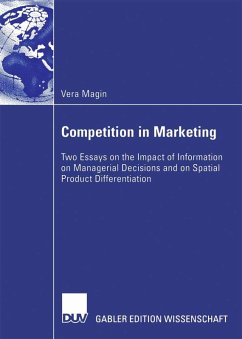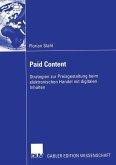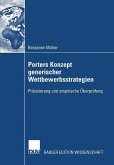In her first essay Vera Magin uses primary experimental data to explore the effects of information on marketing decisions, performance, and competition. In the second essay she discusses several approaches to measure product differentiation in spatial contexts.
The first portion of Dr. Magin' s dissertation research focuses on the impact of demand related information on marketing activity. More precisely, Dr. Magin addresses important questions such as the degree to which firms equipped with demand-related information (DRI) introduce more products, satisfy consumers better, and, most fundamentally, make more money than firms without such DRI. This portion of Dr. Magin's dissertation work involves condensing the broad extant knowledge pertaining to marketing information and creating new hypotheses, empirically testing these hypotheses, and linking results to managerial practice as well as linking the findings to research opportunities. In addition to this, Dr. Magin's dissertation research entails a more theoretical and quantitative portion that addresses the problem of product differentiation. Here, she immerses herself into the areas of distance functions, distance measures, and spatial product differentiation. This portion of her dissertation is more quantitative and theoretical. In the first portion of her dissertation, Dr. Magin augments extant knowledge from economics, game theory, decision research, and social psychology into a sizeable set of hypotheses. To empirically test these hypotheses, she makes a large effort to collect primary data. More precisely, she uses a complex market simulation to conduct experiments through the course of three full years. Next, she tests her hypotheses using a variety of conservative tests. Her results are very interesting as she finds much support for the linkages she hypothesized.
Hinweis: Dieser Artikel kann nur an eine deutsche Lieferadresse ausgeliefert werden.
The first portion of Dr. Magin' s dissertation research focuses on the impact of demand related information on marketing activity. More precisely, Dr. Magin addresses important questions such as the degree to which firms equipped with demand-related information (DRI) introduce more products, satisfy consumers better, and, most fundamentally, make more money than firms without such DRI. This portion of Dr. Magin's dissertation work involves condensing the broad extant knowledge pertaining to marketing information and creating new hypotheses, empirically testing these hypotheses, and linking results to managerial practice as well as linking the findings to research opportunities. In addition to this, Dr. Magin's dissertation research entails a more theoretical and quantitative portion that addresses the problem of product differentiation. Here, she immerses herself into the areas of distance functions, distance measures, and spatial product differentiation. This portion of her dissertation is more quantitative and theoretical. In the first portion of her dissertation, Dr. Magin augments extant knowledge from economics, game theory, decision research, and social psychology into a sizeable set of hypotheses. To empirically test these hypotheses, she makes a large effort to collect primary data. More precisely, she uses a complex market simulation to conduct experiments through the course of three full years. Next, she tests her hypotheses using a variety of conservative tests. Her results are very interesting as she finds much support for the linkages she hypothesized.
Hinweis: Dieser Artikel kann nur an eine deutsche Lieferadresse ausgeliefert werden.








